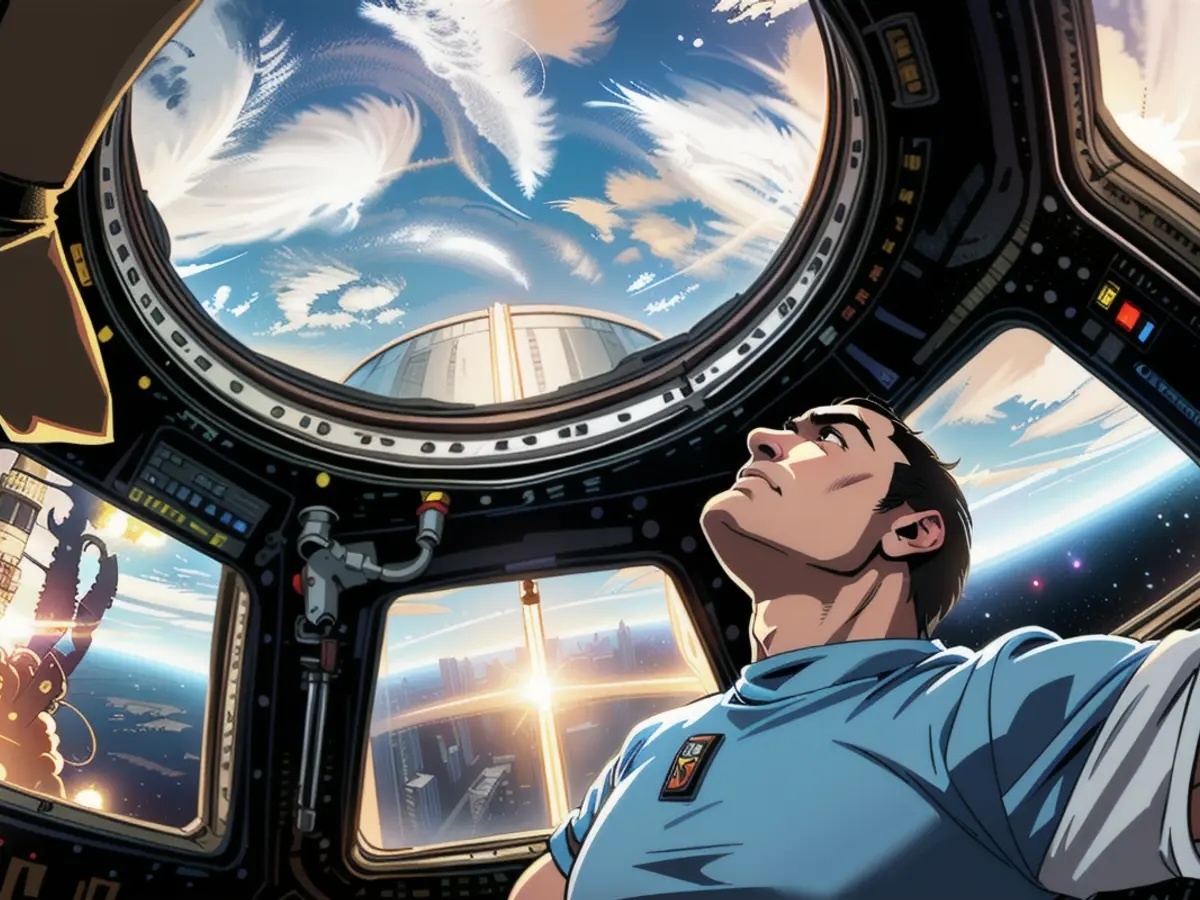29.05.2024
Astro-Alex" shared his space journey through photos and videos, involving Earth's people in his mission. After ten years, he reflects on his objectives, ambitions, and the solitude of being an astronaut.

Alexander Gerst blickt während seines Fluges mit der Internationalen Raumstation ISS durch ein Fenster in der Kuppel auf die Erde.
Exploration of the cosmos - Alexander Gerst embarked on his initial journey into space.
Alexander Gerst, a European Space Agency (ESA) astronaut, still remembers the mesmerizing night in Kazakhstan. "When you ascend the stairs to the rocket and leave this world momentarily, there's also a moment of solitude," the astronaut recollects. "You feel the gravity of the situation, while everyone else is enthused. Whoever boards such a rocket must be at peace with themselves, knowing they might not return."
A decade ago, on May 28, 2014, Gerst embarked on his first space journey - with a breathtaking night launch from the acclaimed Baikonur Cosmodrome as the 11th German. The following morning, Gerst began working, much like the rest of the Germans - except he was 400 kilometers above Earth, on the International Space Station (ISS). "Astronaut-Alex" allowed both professionals and laypersons to be a part of his journey. "I had relinquished much and risked everything for this aspiration. And then came the instant when I realized: I'm in space. The immense weight is lifted from your shoulders at that moment."
Tensions due to the Ukraine War
Born in Künzelsau, Baden-Württemberg, Gerst had spent 165 days in space and went to the ISS again in 2018 - both times from Baikonur and both times with a Russian Soyuz rocket. Relations were already strained at the time because of Russia's annexation of Crimea, and the war in Ukraine worsened these relations. Gerst laments this. "With every war, things are lost in a catastrophic manner. That's the nature of a war, and space travel is not an exception."
Germany's former space chief Jan Wörner was uncertain whether a trip to Baikonur was a wise decision. "It was just after the annexation of Crimea." Upon arriving in Baikonur, however, Wörner encountered Gerst and his Russian and American companions in high spirits. "When Alex climbed the stairs, I had a minuscule feeling of responsibility. I said 'Farewell' - only to promptly repent and say 'Until we meet again' instead," says Wörner today.
363 days in space over two missions: No German has spent as much time in orbit as Gerst. Furthermore, he participated in an extravehicular space activity: According to experts, this makes the man with the bald head a potential candidate for the moon. The 48-year-old sees possibilities for an EU astronaut or astronautess within the planned American moon mission "Artemis." In this venture, four astronauts are set to travel to the moon - two to remain in lunar orbit and two to set foot on the moon, after not doing so since 1972.
An EU astronaut or astronautess on the moon?
A flight of an ESA astronaut or astronautess is scheduled for "Artemis 4" and "Artemis 5," as ESA Director General Josef Aschbacher announced in November. However, it's unclear whether they or Gerst will be among the four astronauts who will not just fly to the moon but also land on it. "That's still not determined," Aschbacher explained.
Currently, there are six active astronauts and astronauts with space experience at Esa, according to Gerst. "I don't think any of us would turn down the opportunity." But what exactly do we desire there? "The Moon is akin to a voluminous history book about the past of the Earth," says Gerst. "My prophecy is that we will have several research stations on the Moon, carrying out science in harmony. Similar to Antarctica. The exploration of Antarctica was initially questioned by some people, arguing that it was only ice and snow. Today, there are various permanent stations there, undertaking vital data collection for comprehending climate change. I myself have researched as a geophysicist on five expeditions there."
The Moon could also be a stepping stone for a potential Mars mission. "Humans on Earth are an island people in space," says Gerst. "We are inquisitive and desire to understand what lies beyond us." Through space exploration, we will discover things we cannot imagine now."
"We are at the onset of a new era"
Hundreds of thousands of generations have gazed up at the stars and asked: What's out there? "We're only the second generation that, owing to space travel, can look back at Earth from the outside," says Gerst. Almost 65 years after the first manned space flight in 1961, humanity is still at the rudimentary stages of development.
Back in 1961, the Russian Yuri Gagarin was the first person to venture into space from Baikonur. "You ascend the same staircase as Gagarin. Up, higher, and higher. You sit, takeoff, and land half a year later in the steppe. The staircase always leads up. No astronaut has ever descended it."
Gerst recalls clearly his first time sitting in the capsule a decade ago, mulling over all the possibilities. "You're trapped in a series of days before takeoff. Can I undertake this? What if not? What should I witness one more time beforehand? It's referred to as 'courage for the dive'", Gerst chuckles, "That might be an effective strategy for an exam, but definitely not for a space journey."
Quelle: aussiedlerbote.de
